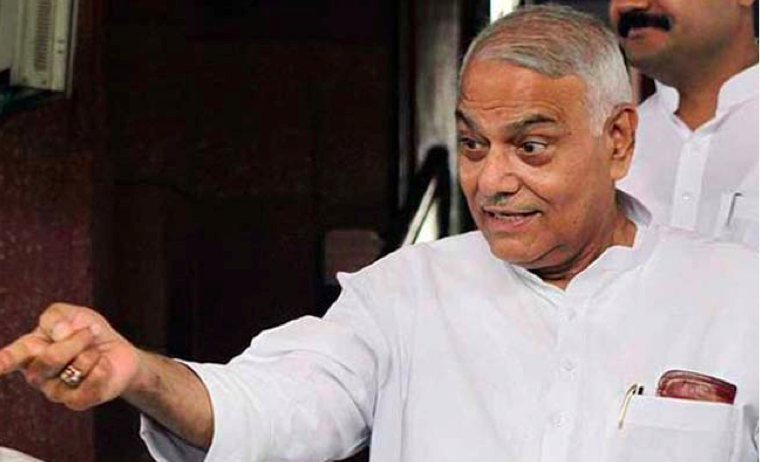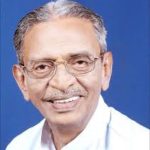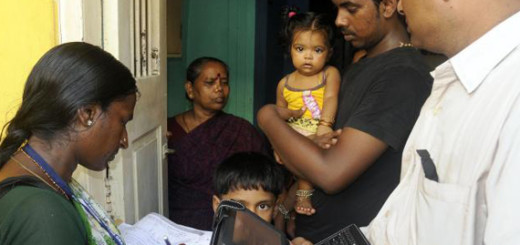BJP Veteran speaks out against BJP Sarkar! Will Domino Effect in party result in course correction?

The senior BJP leader Yashwanth Sinha, 80, accuses fellow BJP Finance Minister Arun Jaitley for doing the worst of things economically in the best of times for India, for making a mess of the finance minister’s portfolio, which he himself had handled during Vajpayee government in 1998-2002. He was finance minister twice and so knows what he says. Hence his statement: For quarter after quarter, the growth rate of the economy has been declining until it reached the low of 5.7 per cent in the first quarter of the current fiscal, the lowest in three years. What he is telling Modi plainly but indirectly is that he is running a government with his Yes-men or ‘chumchas’ for the benefit of those in government only and not for the good and development of the general public.
He is now supported by other BJP stalwarts like Subramanian Swami, Bihar BJP MP Shatrughan Sinha and also Congress former Finance Minister P.Chidambaram, another expert. Knowledgeable persons in the RSS also reportedly are not on the same page with Modi on many issues. If only two other BJP leaders spoke up in support of Yashwanth, it was because the senior Yashwanth himself made bold to speak out first in national interest, also because there is written and unwritten orders in the party that no one should speak in public against the official party line. So everyone in the party is fear-stricken to speak, for fear of losing their jobs. Yashwanth said it to a question that some one who wanted to express his opinion was forbidden to do so. There is no freedom of expression in the party and in that sense the BJP Sarkar has killed Indian democracy. What appears is a suspended animation of it.
Domesticated media
The visual and print media in the country are free in name sake only. Actually they are all on a leash like watch dogs to go so far and no further. Recall the raids on the NDTV and the absence of outspoken TV anchors like Burkha Dutt, Rajdeep Sardesai, Arnab Goswami etc. Yashwanth’s critique speaks volumes for his honesty, courage and love for the country. It gave courage to a few of his suffocated colleagues to speak up. All critiques are aimed directly at Jaitely who deserves it richly. Yashwanth makes it clear, Jaitely got his portfolio not because of his competence but because of his readiness to be a “Yes-man” to the PM.
All criticisms are apparently aimed directly at Jaitley, but indirectly at Modi himself and his dictatorial one-man rule. After all public decorum and decency requires not to embarrass the Chief Executive of the country publicly and bluntly. What Yashwanth said is plain enough to make Modi and every body in the country, especially the media to understand that time is running out to do their duty, if they are really interested in the good of the nation.
Any Chances for change?
What are the chances that Modi would take the critique in the right sense and decide to do the needed course correction at least in this late hour? Prospects are not bright. Why? Already when Modi was CM of Gujarat, the then PM Vajpayee had told him publicly that he was not doing his Raj Dharma. But Modi didn’t care to listen. The next balanced person in the BJP Advani also had described Modi’s style of functioning as ‘Event Management’, that is, fooling the public with an avalanche of publicity and show.
Also none of these made any impact on Modi because now Modi has much more power and control of the vast network of social media under his control to do his bidding. Besides his frequent direct access through “Man ki Baat” through National media to indoctrinate a credulous public that he alone is going to be their saviour and of the nation, as Hitler did for Germany.
So it will all depend on how many more in the BJP will take the risk of speaking up truth to power in the national interest first, which will eventually empower opposition parties to get united and speak up forcefully for course correction second, which eventually will prompt the national media, visual and print, to lead a campaign to create a storm of pubic opinion for drastic change in the mind of Modi third, failing which to give wings to create a tsunami in the minds of the general public fourth, to finally produce a better leader in the next general election if Modi still fails to come up to national expectations.
No one is keen to change Modi instantly, as he has proved himself to be a man of both words and action compared to many PMs India had. No doubt it is thanks to Modi that India today has a better and brighter image internationally among the nations of the world. He should therefore be helped to change and become an acceptable leader to all sections of the country before he becomes too bad for the country. This we believe is what all well-meaning people in the country wish and pray for. Yes we should also pray and storm the heavens for this happen as early as possible. james kottoor, editor ccv.
Please read below BJP Yashwant’s article in Indian Express
I need to speak up now
By Yashwant Sinha, in Indian Express, September 27, 2017
Yashwant Sinha writes: The economy is on a downward spiral, is poised for a hard landing. Many in the BJP know it but do not say it out of fear
In the pic: BJP’S Yashwanth Sinha hit out at Finance Minister Arun Jaitley and centre over economy(file)
I shall be failing in my national duty if I did not speak up even now against the mess the finance minister has made of the economy. I am also convinced that what I am going to say reflects the sentiments of a large number of people in the BJP and elsewhere who are not speaking up out of fear.
Arun Jaitley is considered to be the best and the brightest in this government. It was a foregone conclusion before the 2014 elections that he would be the finance minister in the new government. His losing his Lok Sabha election from Amritsar was not allowed to come in the way of this appointment.
One may recall that in similar circumstances Atal Bihari Vajpayee had refused to appoint Jaswant Singh and Pramod Mahajan, two of his closest colleagues in the party, to his cabinet in 1998. His indispensability was established further when the prime minister rewarded him not only by giving him the finance ministry including the department of disinvestment, but also the ministries of defence and corporate affairs. Four ministries in one go out of which he still retains three.
I have handled the ministry of finance and know how much hard work there is in that ministry alone. Finance Ministry, in the best of times, calls for the undivided attention of its boss if the job has to be properly done. In challenging times it becomes more than a 24/7 job. Naturally, even a superman like Jaitley could not do justice to the task.
Jaitley was, to begin with, a lucky finance minister, luckier than any in the post-liberalisation era. Depressed global crude oil prices placed at his disposal lakhs of crores of rupees. This unprecedented bonanza was waiting to be used imaginatively. The legacy problems like stalled projects and bank NPAs were no doubt there and should have been managed better like the crude oil bonanza. But the oil bonanza has been wasted and the legacy problems have not only been allowed to persist, they have become worse.
So, what is the picture of the Indian economy today? Private investment has shrunk as never before in two decades, industrial production has all but collapsed, agriculture is in distress, construction industry, a big employer of the workforce, is in the doldrums, the rest of the service sector is also in the slow lane, exports have dwindled, sector after sector of the economy is in distress, demonetisation has proved to be an unmitigated economic disaster, a badly conceived and poorly implemented GST has played havoc with businesses and sunk many of them and countless millions have lost their jobs with hardly any new opportunities coming the way of the new entrants to the labour market. For quarter after quarter, the growth rate of the economy has been declining until it reached the low of 5.7 per cent in the first quarter of the current fiscal, the lowest in three years. The spokespersons of the government say that demonetisation is not responsible for this deceleration. They are right. The deceleration had started much earlier. Demonetisation only added fuel to fire.
And please note that the methodology for calculation of the GDP was changed by the present government in 2015 as a result of which the growth rate recorded earlier increased statistically by over 200 basis points on an annual basis. So, according to the old method of calculation, the growth rate of 5.7 per cent is actually 3.7 per cent or less.
Even the SBI, the largest public sector bank of the country, has stated with unusual frankness that the slowdown is not transient or “technical”, it is here to stay and the slowdown in demand has only aggravated the situation. It has openly contradicted what the BJP President said just a few days ago that the slowdown in the last quarter was on account of “technical” reasons and will be corrected soon. According to the SBI chairman, the telecom sector is the latest entrant to the long list of stressed sectors.
The reasons for this decline are not far to seek nor have they appeared suddenly. They have been allowed to accumulate over time to cause the present crisis. It was not difficult to anticipate them and take counter measures to deal with them. But that called for devoting time to the task, serious application of mind, understanding of the issues and then working out a game plan to tackle them. It was perhaps too much to expect from a person who was carrying the heavy burden of so many extra responsibilities. The results are there for all of us to see.
The prime minister is worried. A meeting convened by the prime minister with the finance minister and his officials appears to have been postponed indefinitely. The finance minister has promised a package to revive growth. We are all waiting with bated breath for this package. It has not come so far. The only new thing is the reconstituted Economic Advisory Council of the prime minister. Like the five Pandavas they are expected to win the new Mahabharat war for us.
The performance of the monsoon this year has not been flattering. This will further intensify rural distress. The farmers have received “massive” loan waivers from some state governments varying from one paise to a few rupees in some cases. Forty leading companies of the country are already facing bankruptcy proceedings. Many more are likely to follow suit. The SME sector is suffering from an unprecedented existential crisis. The input tax credit demand under the GST is a whopping Rs 65,000 crore against a collection of Rs 95,000 crore.
The government has asked the income tax department to chase those who have made large claims. Cash flow problems have already arisen for many companies specially in the SME sector. But this is the style of functioning of the finance ministry now. We protested against raid raj when we were in opposition. Today it has become the order of the day. Post demonetisation, the income tax department has been charged with the responsibility of investigating lakhs of cases involving the fate of millions of people. The Enforcement Directorate and the CBI also have their plates full. Instilling fear in the minds of the people is the name of the new game.
Economies are destroyed more easily than they are built. It took almost four years of painstaking and hard work in the late nineties and early 2000 to revive a sagging economy we had inherited in 1998. Nobody has a magic wand to revive the economy overnight. Steps taken now will take their own time to produce results. So, a revival by the time of the next Lok Sabha election appears highly unlikely. A hard landing appears inevitable. Bluff and bluster is fine for the hustings, it evaporates in the face of reality.
The prime minister claims that he has seen poverty from close quarters. His finance minister is working over-time to make sure that all Indians also see it from equally close quarters. (The writer, a member of the BJP, is a former Union finance minister)


















Isaac Gomes reproduces below a counter to Yashwant Sinha's lambasting Finance Minister Arun Jaitely:
1st October 2017 : The Times of India (Mumbai)
SWAMINOMICS – Dear FM, Yashwant Sinha is wrong so don't be tempted by a fiscal quick-fix
SWAMINATHAN S ANKLESARIA AIYAR

New Delhi has been abuzz with talk of a big fiscal spending package of maybe Rs 40,000 crore to `kick-start' the economy, which has slowed for five quarters in a row. Adding to the excitement has been the virulent castigation of economic policies (especially demonetisation and the red tape accompanying GST) by former BJP finance minister Yashwant Sinha. He warns that the economy is spiralling downwards to a hard landing.
While the economy faces serious problems, these cannot be remedied by a fiscal spending spree.Finance minister Arun Jaitley must ignore panicky notions that a crash spending package can remedy structural problems that need deep reforms. Export stagnation for three years, a banking system bur dened with huge bad debts, and high real interest rates have dragged down the economy . None of these can be rectified by a spending spree.
Nobody should mistake Yashwant Sinha's criticisms as a call for a fiscal boost. He was always a fiscal hawk, convinced (quite rightly) that the longterm gains of prudence vastly outweighed the short-term gains of a spending spree. He worries about the inspector raj that is returning with GST paperwork and a huge expansion of income tax investigations. His warnings have a core of truth: GST paperwork is monstrously tough for small companies, and the notion that our notoriously corrupt income tax can become the standard-bearers of tax honesty is bound to evoke laughter. Yet both GST and improved tax compliance are essential long-term goals, despite short-term costs.
India already has a consolidated Centre-State fiscal deficit of 6-7% of GDP , the highest by far of any major economy . Many countries have gone bust with a lower fiscal deficit, and India survives only because it has a high savings rate. Deficits need to be reduced, not expanded.
Indeed, steady reduction of the fiscal deficit in recent years has improved India's credibility greatly , reduced the rate at which it can borrow abroad, and attracted foreign investment. Why throw away these gains for the tiny benefits, if any, of a spending spree?
The Central fiscal deficit was supposed to be reduced to 3% of GDP by 2008, but that goal has been postponed by a full decade. Jaitley had earlier promised to cut the fiscal deficit to 3% this year but ultimately opted for 3.2%, presenting the additional 0.2% as a fiscal boost to accelerate the economy .That failed, and this should surprise nobody . Even for an efficient economy , an additional 0.2% of investment will increase GDP by just 0.05%, too small to even measure accurately. Meanwhile it has negative consequences like reduced foreign confidence in India, higher dollar outflows, and higher dollar borrowing rates. The same problems will afflict another fiscal boost of Rs 40,000 crore. Too many people see a spending spree as a quick Keynesian way of producing rapid growth. Keynes advocated a fiscal boost when a recession struck, causing a sudden shrinkage of demand. Conversely, he advocated a budget surplus during a boom.This leaning against the current stage of the business cycle is called contra-cyclical fiscal policy.
But Rathin Roy of the National Institute of Public Finance and Policy says research has failed to uncover any business cycle in India. So, contracyclical policy in India is conceptually dubious or groundless. It is far better to stick to prudent longterm fiscal goals than attempt to fine-tune fiscal deficits on the erroneous notion that economic ups and downs can so easily be manipulated.
In theory, spending a quick Rs 40,000 crore extra on infrastructure sounds attractive. In practice infrastructure projects have faced multiple delays and problems leading to bankrupt builders and bad debts of lakhs of crores. Experience shows that the government takes a long time to spend additional public funds productively . Infrastructure spending needs to rise steadily , not as a short-term stimulus.
The economy has been hit by short-term shocks imposed by demonetisation and the launch of GST.But the shocks will gradually fade away , resulting in a bounce-back of growth in 2018. There is no evidence of a coming hard landing, as predicted by Yashwant Sinha.
Nor will 8% growth return sustainably without major reforms. The right way to accelerate growth is to relentlessly increase productivity . This implies reforms that ease business hassles, greatly improve all government services, and instill confidence.Export stagnation must be checked by an aggressive exchange rate policy , lower interest rates, and trade facilitation. Massive bad debts of banks must be tackled. This means a long hard slog, not a quickie fiscal boost.
Yashwant Sinha is not the only one, these seven BJP leaders have also attacked Modi government
Senior BJP leader Yashwant Sinha has lashed out at the Narendra Modi government a number of times and on a number of issues. However, he is not the only BJP leader to have sung a different tune from that of the party and the Modi government.
He was particularly unforgiving on Finance Minister Arun Jaitley and claimed that the economy was heading towards a "hard landing".
Yashwant Sinha, 84, has been a vociferous critic of the Modi government ever since he was not included in the union cabinet after the 2014 Lok Sabha elections. He took on the party by commenting that all those who are above the age of 75 were declared brain dead on May 26, 2014 (the day the Modi government was sworn in).
Besides the age criterion, the former bureaucrat-turned-politician has been speaking against the decisions which are considered the biggest achievements of the Modi government – such as demonetisation, GST, GDP and the abolition of the Planning Commission.
Yashwant Sinha, father of Union Minister of State for Civil Aviation Jayant Sinha, has also taken a stand opposite to that of the party by favouring a dialogue with the separatists and the Hurriyat in trouble-torn Kashmir.
Besides Yashwant Sinha, the following leaders have also been occasionally hitting out at the BJP and the Modi government:
SHATRUGHAN SINHA
Just like Yashwant Sinha, actor-turned-politician Shatrughan Sinha has been a constant and vocal critic of the Modi government's decisions. In the latest episode, he is the only senior BJP leader to have come out in defence of Yashwant Sinha.
The Patna Sahib MP endorsed Yashwant Sinha's views and said the former finance minister was a true statesman and that his comments were in the interest of both the party and the nation.
Shatrughan Sinha also urged Modi to appear before the press and answer real questions.
Even in the past, the actor-politician has embarrassed the BJP leadership by praising and hobnobbing with leaders of BJP's rival parties such as RJD supremo Lalu Prasad, Delhi Chief Minister Arvind Kejriwal and Bihar Chief Minister Nitish Kumar [when his JD(U) was part of the previous Mahagathbandhan government in the state].
Shatrughan has been airing views against the party's official stand. He had gone to the extent of congratulating both Lalu and Nitish for defeating the BJP.
KIRTI AZAD
The cricketer-turned-politician was suspended in December 2015 after he launched a personal attack on Finance Minister Arun Jaitley. He alleged financial irregularities in Delhi and District Cricket Association (DDCA) during Jaitley's tenure as its chief.
He argued with Jaitley in Parliament over the issue, provoked him and even called him "napunsak" (impotent) on social media. However, later he claimed that his Twitter account had been hacked.
As revealed by Jaitley, the Darbhanga MP had met Congress chief Sonia Gandhi during the UPA regime, following which the Centre had referred the DDCA matter to the Serious Fraud Investigation Office (SFIO)
LK ADVANI
Senior BJP leader Lal Krishna Advani has also expressed displeasure over the functioning of the Modi government. However, he has been subtle in censuring the BJP-led NDA government.
Advani was against the elevation of Modi as the BJP's prime ministerial candidate for the 2014 Lok Sabha elections . He had opposed it by skipping the BJP's Parliamentary Board meeting on September 13, 2013 and resigning from all posts of the party.
Advani, who was Modi's mentor at one point in time, mellowed down after the BJP came to power. But on a couple of occasions, he certainly has disapproved of the Modi government's decisions.
In an interview to an English daily in June 2015, he created ripples by commenting that he didn't have the confidence to believe the Emergency would not happen again. The statement was construed by opposition parties as the "first indictment of Modi's politics".
In December 2016, during the Winter session of Parliament, he expressed his displeasure with the Modi government and Lok Sabha Speaker Sumitra Mahajan over constant disruption of the House for three weeks.
Advani reportedly said he would speak publicly that the speaker was not running the House and that both sides (treasury and opposition benches) were a party to that.
MURLI MANOHAR JOSHI
Very much like Advani, senior party leader Murli Manohar Joshi too was against the projection of Modi as BJP's face for the 2014 general elections. However, he was not as vocal as Advani.
Instead of making them cabinet ministers, the BJP created a new cell Margdarshak Mandal and put Advani and Joshi, besides former prime minister Atal Bihari Vajpayee in it.
Joshi, an MP from Kanpur, too has publicly attacked the Modi government. On one occasion, he censured Modi's flagship Namami Gange project to clean the Ganga. He questioned the manner in which the cleaning of the Ganga had been undertaken and said it would ensure that the river "does not get cleaned even in the next 50 years".
Two days after the BJP's humiliating defeat in the 2015 Bihar Assembly elections, Joshi, along with Advani, former Union minister Arun Shourie and RSS ideologue KN Govindacharya had lashed out at Team Modi. After meeting at Joshi's residence in the national capital, the leaders issued a statement, criticising the decision-making process in the party.
The stinging statement warned Modi and BJP chief Amit Shah not to shrug off their responsibility after the "disastrous showing" in Bihar. They ascribed the cause for the defeat to the manner in which the party had been "emasculated".
Demanding a review of the election rout, the veterans warned that this style of functioning had destroyed the consensual character of the party. "This review must not be done by the very persons who have managed and who have been responsible for the campaign in Bihar", the statement added.
What confounds political observers is that despite having uneasy relations with the top brass in the BJP now, Advani and Joshi make themselves available in all party programmes, for instance when Ram Nath Kovind was filing his nomination for the presidential election.
ARUN SHOURIE
Journalist-turned-politician Arun Shourie keeps attacking Prime Minister Narendra Modi. At times, his diatribes have proved worse than those of Delhi Chief Minister Arvind Kejriwal, who had called Modi a "coward" and "psychopath".
In an interview last year, he alleged that the prime minister possesses the three personality traits that make the "dark triad" – narcissism, Machiavellian and remorselessness. Shourie accused Modi of running a "one-man presidential" government and expressed fears that over the next three years, there would be "a more systematic attempt to curb civil liberties" and an increase in "decentralised intimidation" besides "choking" of "inconvenient voices".
In the case of both Yashwant Sinha and Shourie, the BJP has debunked their charges, saying they were rants of frustrated leaders.
SUBRAMANIAN SWAMY
Like Yashwant Sinha, Subramanian Swamy too keeps targeting Arun Jaitley. Close on the heels of Yashwant Sinha's criticism of GST, he also flayed the new tax regime.
Swamy said GST should not have been implemented in a hurry. He alleged that the involvement of private companies in the GST Network (GSTN) was leading to harassment.
A few days ago, the Rajya Sabha MP had sought to put the Modi government in the dock for failing to take necessary steps to revive the slow economic growth.
Swamy, who is also known as a maverick politician, has been warning the Modi government on Non-Performing Assets of public banks and of an imminent banking crisis.
In the past, Swamy has directly attacked the then RBI governor Raghuram Rajan and the chief economic adviser to the government Arvind Subramanian. He also targeted Jaitley.
When Jaitley was on a visit to China last year, Swamy mocked him in a tweet. He said the BJP should direct the ministers to wear traditional and modernised Indian clothes while abroad. "In coat and tie, they look like waiters," he posted.
RK SINGH
The inclusion of Raj Kumar Singh, the bureaucrat-turned-politician, in the Modi cabinet in the September 3 reshuffle of council of ministers had surprised political observers.
About two years ago, the first-time MP from Arrah in Bihar had levelled grave charges against the BJP leadership ahead of the state polls. He alleged that party tickets were being sold to criminals. This had immensely embarrassed the BJP and given the Opposition a handle to attack it.
It was Singh, then an IAS officer serving in Bihar, who had arrested Advani from Samastipur and halted his rath yatra to Ayodhya. Later, he went to become the union home secretary during the UPA regime.
However, as luck would have it, Singh is now the Union Minister of State (independent charge) for Power and New and Renewable Energy.
While RK Singh has become a minister and may not speak against the government, the BJP still faces the threat of being targeted by the others such as Yashwant Sinha and Shatrughan Sinha. Except Azad, it has not taken any action against the others. Perhaps, the leaders are testing the party leadership's patience.
(Source: India Today 29th September 2017)